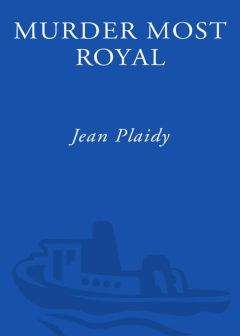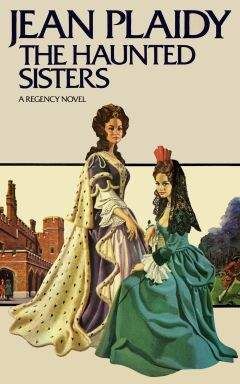Jean Plaidy - Murder Most Royal: The Story of Anne Boleyn and Catherine Howard
На электронном книжном портале my-library.info можно читать бесплатно книги онлайн без регистрации, в том числе Jean Plaidy - Murder Most Royal: The Story of Anne Boleyn and Catherine Howard. Жанр: Прочее издательство неизвестно, год 2004. В онлайн доступе вы получите полную версию книги с кратким содержанием для ознакомления, сможете читать аннотацию к книге (предисловие), увидеть рецензии тех, кто произведение уже прочитал и их экспертное мнение о прочитанном.
Кроме того, в библиотеке онлайн my-library.info вы найдете много новинок, которые заслуживают вашего внимания.

Jean Plaidy - Murder Most Royal: The Story of Anne Boleyn and Catherine Howard краткое содержание
Murder Most Royal: The Story of Anne Boleyn and Catherine Howard читать онлайн бесплатно
Anne, who was by nature honest, had no great respect for her lover’s conscience; she was impatient, and showed it; she insisted that Wolsey’s arrogance should not be allowed to pass. And Henry, fearing to lose her, ready to give her anything she wished, wrote sternly to Wolsey; and that letter showed Wolsey more clearly than anything that had gone before that he was slipping dangerously, and he knew no way of gaining a more steady foothold on the road of royal favor.
Now at last he understood that she who had the King’s ear was indeed a rival to be feared. And he was caught between Rome and Henry; he had no plans; he could see only disaster coming out of this affair. So he feigned sickness to give himself time to prepare a plan, and sick at heart, he felt defeat closing in on him.
The legate had arrived from Rome, and old gouty Campeggio was ready to try the case of the King and Queen. Crowds collected in the streets; when Queen Katharine rode out, she was loudly cheered, and so likewise was her daughter Mary. Katharine, pale and wan from worry, Mary, pale from her illness, were martyrs in the eyes of the people of London; and the King begged Anne not to go abroad for fear the mob might do her some injury.
Anne was wretched, longing now to turn from this thorny road of ambition; not a moment’s real peace had she known since she had started to tread it. The King was continually trying to force her surrender, and she was weary with the fight she must put up against him. And when Henry told her she must once more go back to Hever, as the trial was about to begin, she was filled with anger.
Henry said humbly: “Sweetheart, your absence will be hard to bear, but my one thought is to win our case. With you here...”
Her lips curled scornfully, for did she not know that he would plead his lack of interest in a woman other than his wife? Did she not know that he would tell the Cardinals of his most scrupulous conscience?
She was willful and cared not; she was foolish, she knew, for did she not want the divorce? She was hysterical with fear sometimes, wishing fervently that she was to marry someone who was more agreeable to her, seeing pitfalls yawning at the feet of a queen.
“An I go back,” she said unreasonably, “I shall not return. I will not be sent back and forth like a shuttlecock!”
He pleaded with her. “Darling, be reasonable! Dost not wish this business done with? Only when the divorce is complete can I make you my Queen.”
She went back to Hever, having grown suddenly sick of the palace, since from her window she saw the angry knots of people and heard their sullen murmurs. “Nan Bullen! The King’s whore...We want no Nan Bullen!”
Oh, it was shameful, shameful! “Oh, Percy!” she cried. “Why did you let them do this to us?” And she hated the Cardinal afresh, having convinced herself that it was he who, in his subtle, clever way, had turned the people against her. At Hever her father treated her with great respect—more respect than he had shown to Mary; Anne was not to be the King’s mistress, but his wife, his Queen. Lord Rochford could not believe in all that good fortune; he would advise her, but scornfully she rejected his advice.
Two months passed, during which letters came from the King reproaching her for not writing to him, assuring her that she was his entirely beloved; and at length telling her it would now be safe for her to return to court.
The King entreated her; she repeated her refusals to all the King’s entreaties.
Her father came to her. “Your folly is beyond my understanding!” said Lord Rochford. “The King asks that you will return to court! And you will not!”
“I have said I will not be rushed back and forth in this uncourtly way.”
“You talk like a fool, girl! Dost not realize what issues are at stake?”
“I am tired of it all. When I consented to marry the King, I thought ’twould be but a simple matter.”
“When you consented...!” Lord Rochford could scarcely believe his ears. She spoke as though she were conferring a favor on His Majesty. Lord Rochford was perturbed. What if the King should grow weary at this arrogance of his foolish daughter!
“I command you to go!” he roared; which made her laugh at him. Oh, how much simpler to manage had been his daughter Mary! He would have sent Anne to her room, would have said she was to be locked in there, but how could one behave so to the future Queen of England!
Lord Rochford knew a little of this daughter. Willful and unpredictable, stubborn, reckless of punishment, she had been from babyhood; he knew she wavered even yet. Ere long she would be telling the King she no longer wished to marry him.
“I command you go!” he cried.
“You may command all you care to!” And at random she added, “I shall not go until a very fine lodging is found for me.”
Lord Rochford told the King, and Henry, with that pertinacity of purpose which he ever displayed when he wanted something urgently, called in Wolsey; and Wolsey, seeking to reinstate himself, suggested Suffolk House in place of Durham House, which the King had previously placed at her disposal.
“For, my lord King, my own York House is next to Suffolk House, and would it not be a matter of great convenience to you, if, while the lady is at Suffolk House, Your Highness lived at York House?”
“Thomas, it is a plan worthy of you!” The fat hand rested on the red-clad shoulder. The small eyes smiled into those of his Cardinal; the King was remembering that he had ever loved this man.
Anne came to Suffolk House. Its grandeur overawed even her, for it was the setting for a queen. There would be her ladies-in-waiting, her trainbearer, her chaplain; she would hold levees, and dispense patronage to church and state.
“It is as if I were a queen!” she told Henry, who was there to greet her.
“You are a queen,” he answered passionately.
Now she understood. The fight was over. He who had waited so long had decided to wait no longer.
They would eat together informally at Suffolk House, he told her. Dear old Wolsey had lent him York House, next door, that he might be close and could visit her unceremoniously. Did she not think she had judged the poor old fellow too harshly?
There was about the King an air of excitement this day. She understood it, and he knew she understood it.
“Mayhap we judge him too hardly,” she agreed.
“Darling, I would have you know that you must lack nothing. Everything that you would have as my Queen—which I trust soon to make you—shall be yours.” He put burning hands on her shoulders. “You have but to ask for what you desire, sweetheart.”
“That I know,” she said.
Alone in her room, she looked at herself in her mirror. Her heart was beating fast. “And what have you to fear, Anne Boleyn?” she whispered to her reflection. “Is it because after tonight there can be no turnback, that you tremble? Why should you fear? You are beautiful. There may be ladies at court with more perfect features, but there is none so intoxicatingly lovely, so ravishingly attractive as Anne Boleyn! What have you to fear from this? Nothing! What have you to gain? You have made up your mind that you will be Queen of England. There is nothing to fear.”
Her eyes burned in her pale face; her beautiful lips were firm. She put on a gown of black velvet, and her flesh glowed as lustrous as the pearls that decorated it.
She went out to him, and he received her with breathless wonder. She was animated now, warmed by his admiration, his passionate devotion.
He led her to a table where they were waited upon discreetly; and this tte--tte meal, which he had planned with much thought, was to him complete happiness. Gone was her willfulness now; she was softer; he was sure of her surrender; he had waited so long, he had lived through this so often in his dreams; but nothing he had imagined, he was sure, could be as wonderful as the reality.
He tried to explain his feelings for her, tried to tell her of how she had changed him, how he longed for her, how she was different from any other woman, how thoughts of her colored his life; how, until she came, he had never known love. Nor had he, and Henry in love was an attractive person; humility was an ill-fitting garment that sat oddly on those great shoulders, but not less charming because it did not fit. He was tender instead of coarse, modest instead of arrogant; and she warmed towards him. She drank more freely than was her custom: she had confidence in herself and the future.
Henry said, when they rose from the table: “Tonight I think I am to be the happiest man on Earth!” Apprehensively he waited for her answer, but she gave no answer, and when he would have spoken again he found his voice was lost to him; he had no voice, he had no pride; he had nothing but his great need of her.
She lay naked in her bed, and seeing her thus he was speechless, nerveless, fearful of his own emotion; until his passion rushed forth and he kissed her white body in something approaching a frenzy.
She thought: I have nothing to fear. If he was eager before, he will be doubly eager now. And, as she lay crushed by his great weight, feeling his joy, his ecstasy, she laughed inwardly and gladly, because now she knew there was to be no more wavering and she, being herself, would pursue this thing to the end.
His words were incoherent, but they were of love, of great love and desire and passion and pleasure.
“There was never one such as thee, my Anne! Never, never I swear...Anne Queen Anne...My Queen...”
He lay beside her, this great man, his face serene and completely happy, so she knew how he must have looked when a very small boy; his face was purged of all that coarseness against which her fastidiousness had turned in disgust; and she felt she must begin to love him, that she almost did love him, so that on impulse she leaned over to him and kissed him. He seized her then, laughing, and told her again that she was beautiful, that she excelled his thoughts of her.
“And many times have I taken you, my Queen, in my thoughts. Dost remember the garden at Hever? Dost remember thy haughtiness? Why, Anne! Why I did not take thee there and then I do not know. Never have I wanted any as I wanted thee, Anne, my Queen, my little white Queen!”
She could laugh, thinking—Soon he will be free, and I shall be truly Queen...and after this he will never be able to do without me.
“Aye, and I wonder I was so soft with you, my entirely beloved, save that I loved you, save that I could not hurt you. Now you love me truly not as your King, you said, but as a man....You love me as I love you, and you find pleasure in this, as I do....”
And so he would work himself to a fresh frenzy of passion; so he would stroke and caress her, lips on her body, his hands at her hair and her throat and her breasts.
“There was never love like this!” said Henry of England to Anne Boleyn.
Happiest of Women
AT HORSHAM there was preparation for the Christmas festivities; excitement was high in the ladies’ dormitory. There should be a special Yuletide feast, they said, a good deal more exciting than that one which would be held in the great hall to be enjoyed by all; the ladies were busy getting together gifts for their lovers, speculating as to what they would receive.
“Poor little Catherine Howard!” they said, laughing. “She has no lover!”
“What of the gallant Thomas? Alas, Catherine! He soon forgot thee.”
Catherine thought guiltily that, though she would never forget him, she had thought of him less during the last months; she wondered if he ever thought of her; if he did, he evidently did not think it necessary to let her know.
“It is unwise,” said Isabel, “to think of those who think not of us.”
In the Duchess’s rooms, where Catherine often sat with her grandmother, the old lady fretted about the monotony of life in the country.
“I would we were at Lambeth. Fine doings I hear there are at court.”
“Yes,” answered Catherine, rubbing her grandmother’s back. “My cousin is a most important lady now.”
“That I swear she is! Ah! I wonder what Lord Henry Algernon Percy . . . I beg his pardon, the Earl of Northumberland . . . has to say now! He was too high and mighty to marry her, was he? ‘Very well,’ says Anne, ‘I’ll take the King instead.’ Ha! Ha! And I declare nothing delights me more than to hear the haughty young man is being made wretched by his wife; for so does anyone deserve who thinks himself too fine for my granddaughter.”
“The granddaughter of your husband,” Catherine reminded her once more; and, was cuffed for her words.
“How I should like to see her at Suffolk House! I hear that she holds daily levees, as though she is already Queen. She dispenses charity, which is the Queen’s task. There are those who storm against her, for, Catherine, my child, there will always be the jealous ones. Ah! How I should love to see my granddaughter reigning, at Greenwich! I hear the Queen was most discomfited, and that last Christmas Anne held her revels apart from those of Katharine—which either shocked or delighted all. Imagine her revels! Imagine poor Katharine’s! Herself, my granddaughter, the center of attraction, with George and Wyatt and Surrey and Bryan with her; and who could stand up against them, eh? And the King so far gone in love, dear man, that everything she asks must be hers. Ah! How I should love to be there to see it! And Wolsey, that old schemer, trembling in his shoes, I dare swear. And so he should . . . trying to keep our sovereign lord from marrying her who should be his Queen—for if ever woman was born to be a queen, that woman was my granddaughter Anne!”
“I should love to see her too,” said Catherine wistfully. “Grandmother, when will you go to court?”
“Very soon. I make my plans now. Why, I have only to let her know my desires, and she would send for me. She was ever my favorite granddaughter, and it has always seemed to me that I was a favorite of hers. Bless her! God bless Queen Anne Boleyn!”
“God bless her!” said Catherine.
Her grandmother regarded the girl through narrowed eyes.
“I declare I never saw one so lacking in dignity. I would hear you play to me awhile, Catherine. Music is the only thing for which you seem to have the least aptitude. Go over and play me a tune.”
Catherine eagerly went to the virginals; she hated the ministrations to her grandmother, and regretted that they must be an accompaniment to her racy conversation, which she always enjoyed.
The Duchess, her foot tapping, was only half listening, for her thoughts were far away, at Greenwich, at Eltham, at Windsor, at Suffolk House, at York House. She saw her beautiful granddaughter, queening it in all these places; she saw the King, humble in his love; the color, the music, the gorgeous clothes, the masques; the terror of that man Wolsey whom she had ever hated; and Anne, the loveliest woman in the kingdom, queen of the court.
To be there! To be favored of her who was most favored of the King! “My granddaughter, the Queen.” To see her now and then, lovely, vital; to think of her, loved passionately by the King; mayhap to be on the best of terms oneself with His Majesty, for he would be kind to those beloved of his beloved; and Anne had always had a regard for her scandal-loving, lazy old grandmother—even if she were only the wife of her grandfather!
Похожие книги на "Murder Most Royal: The Story of Anne Boleyn and Catherine Howard", Jean Plaidy
Jean Plaidy читать все книги автора по порядку
Jean Plaidy - все книги автора в одном месте читать по порядку полные версии на сайте онлайн библиотеки My-Library.Info.




